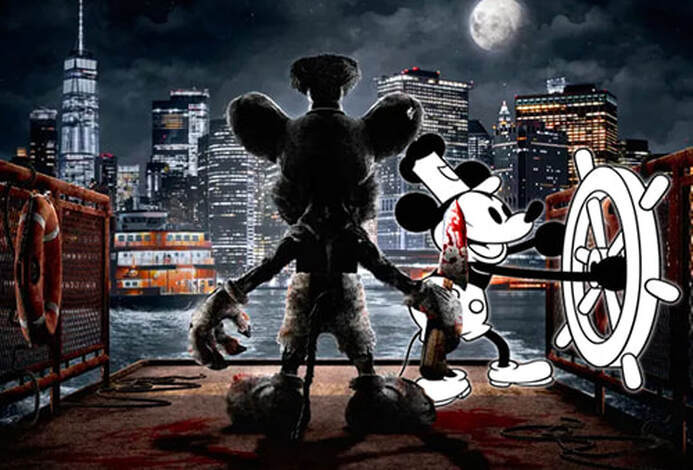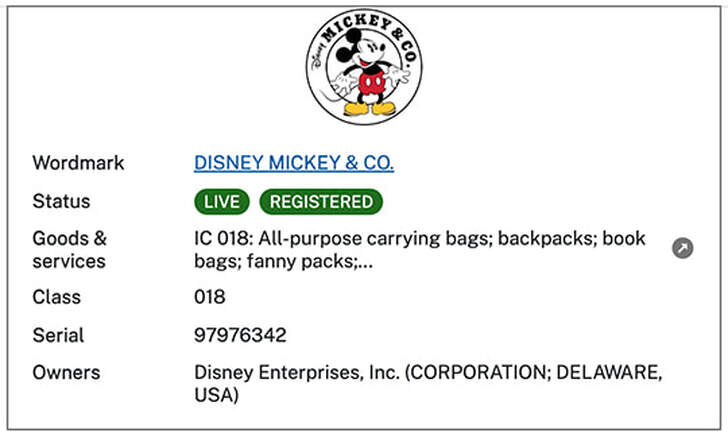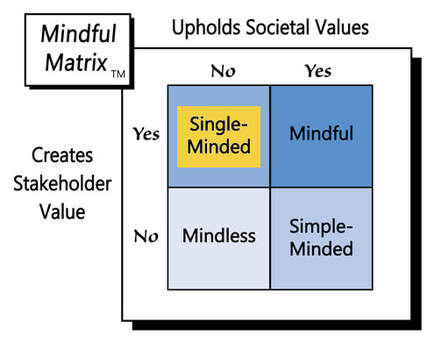author of Honorable Influence - founder of Mindful Marketing
Steamboat Wille, the 1928 animated short film by Disney founder and namesake Walt Disney and animator/cartoonist Ub Iwerks, entered the public domain this past January 1, which means that after 95 years, the earliest version of Mickey Mouse is now “free for all to copy, share, and build upon.”
It’s no surprise that on a planet full of creative and entrepreneurial people, wheels were already turning before public domain day 2024 toward ways of monetizing the newly liberated mouse. Some of those ways would probably make Walt shudder.
One company has announced a violence-filled video game featuring Mickey, while a movie producer/director is planning a Steamboat Willie horror film. Both beg the question:
Is it right to turn Mickey Mouse into a slasher?
Such as question may make some wonder – Doesn’t the Walt Disney Company have a say in this? Can’t the “happiest place on earth” stop someone from making a maniacal Mickey?
To understand Disney’s control over Mickey Mouse, it’s important to distinguish two related but sometimes conflated intellectual property terms: copyrights and trademarks.
Copyrights – Protect “original works of authorship as soon as an author fixes the work in a tangible form of expression,” which means in a fairly permanent way, such as by writing it down, recording it, or taking a picture of it. To be protected, works must possess some minimal amount of creativity. Included are things like poems, musical compositions, books, photos, paintings, blog posts, computer programs, and movies.
The length of copyright protection varies. In general, works created before January 1, 1978, have protection for 95 years, while those created on or after the same date are protected for the lifetime of the author/creator plus 70 years.
Like other works created in 1928, Steamboat Willie’s copyright expired after 95 years and entered the public domain on January 1, 2024.
Trademarks – Are words, phrases, designs, symbols, or some combination thereof, used to differentiate one company’s goods from others in the same category. The more creative and unique a trademark, the better protection it affords.
Anyone can place a “TM” next to a special graphic or phrase they’re using to identify their unique product. To gain more complete legal protection, firms can register their trademark with the Patent and Trademark Office (PTO) and if approved, the unique identifier can be paired with the ® symbol, indicating that it is a registered trademark.
Unlike copyrights, registered trademarks never expire, but to keep them active, firms must continue to use their trademarks in commerce as well as “file certain documents at regular intervals” to show that they’re continuing to use them.
The PTO has a trademark search tool on its site that allows anyone interested to search the Office’s extensive database of “live” (active) and “dead” (inactive) trademarks. A search for “Mickey Mouse” yields over 49,600 results, some alive and some dead trademarks.
The Walt Disney Company and Disney Enterprises, Inc. are responsible for many of the Mickey Mouse registrations, each of which tends to be specific to a particular category of products, such as:
- Jewelry; watches
- Action figures and accessories
- Bathing suits; dresses; gloves; hats; caps; jackets; pajamas
- Balloons; Christmas tree decorations
- Plush toys and jigsaw puzzles.
In short, Disney has a registered trademark for just about any product on which it would likely want to place the words “Mickey Mouse.” The company also has many live and pending trademarks for “Disney Mickey & Co.,” which include a contemporary Mickey Mouse graphic. It would seem, therefore, that Disney is at little risk of losing rights to its heavily trademarked modern Mickey.
In contrast, Steamboat Willie and a few of Walt’s other short films featuring the first Mickey Mouse were protected by copyright, but the early Mickey apparently was not trademarked. So, legally it’s possible to create a violent video game and a horror film with Steamboat Willie.
As evidence, a very similar situation unfolded just two years ago on January 1, 2022, when the characters from A.A. Milne’s 1926 classic “Winnie-the-Pooh” entered the public domain. The next year, writer/director Rhys Frake-Waterfield made the slasher film “Winnie the Pooh: Blood and Honey.” What’s more, a sequel is due to be released later this year. Ironically, the owner of the copyrights to the Pooh characters is/was . . . the Disney corporation.
Cases like these are good reminders that just because something is legal doesn’t necessarily mean it’s ethical. Historic examples of misalignment between legality and morality include the state-sponsored persecution of Jews in Nazi Germany and laws that promoted racial segregation in the United States before the Civil Rights Movement.
So, even if law allows, should Steamboat Willie be cast as a video game or horror film slasher? For people who don’t appreciate those genres, the easy answer is “no,” but what if Willie were made into a short-selling stockbroker, a hard-nose football coach, a doctor with curt bedside manner, an aggressive trial lawyer, etc.?
Although most people probably would not regard those roles as being as blatantly bad as a horror film slasher, they’re still big departures from the whimsical, fun-loving mouse that Walt Disney and Ub Iwerks created, that's the ancestor of the brand character that represents wholesomeness and joy for many, and that serves as a strong connection to fond memories with family and friends.
So, the question about creative works no longer covered by copyright law is this:
Even if law allows for their free use, is it right for others to use them in ways that denigrate, disparage, misrepresent, or malign what the original author intended and, in many cases, invested considerable time and talent to create conceptually then tangibly?
Certainly, the work’s author and their heirs are one very important stakeholder group to consider. Although the author will be deceased by the time their work enters the public domain, their legacy lives on and doesn’t deserve to be tarnished.
Another primary group of stakeholders are the people who enjoy the work. They would like to continue to appreciate it, if not in its original form, then in one that honors and extends its positive perceptions.
There’s also the notion of respecting the work for its own sake. Just like most would consider it wrong to shout during an orchestra performance, deface a painting, litter a pristine landscape, or talk on a cellphone during a play, it also might be considered poor taste to pejoratively alter a creative work.
Human beings are unique in their capacity to create. The creative process is almost always a collective endeavor – if individuals are not working together directly, then they are sharing/borrowing ideas and gaining inspiration from others across distance and time.
It’s good to accept and contribute to the collective nature of the creative process. It’s also important to respect what others create by not deprecating their work in material ways that might produce a lasting negative impact.
Casting Steamboat Willie as a serial killer may be legal, but morally it’s gross degradation of a time-honored creative work that’s closely connected to a trusted brand, which makes the projected horror film and violent videogame strategies “Single-Minded Marketing.”
Learn more about the Mindful Matrix.
Check out Mindful Marketing Ads and Vote your Mind!




 RSS Feed
RSS Feed